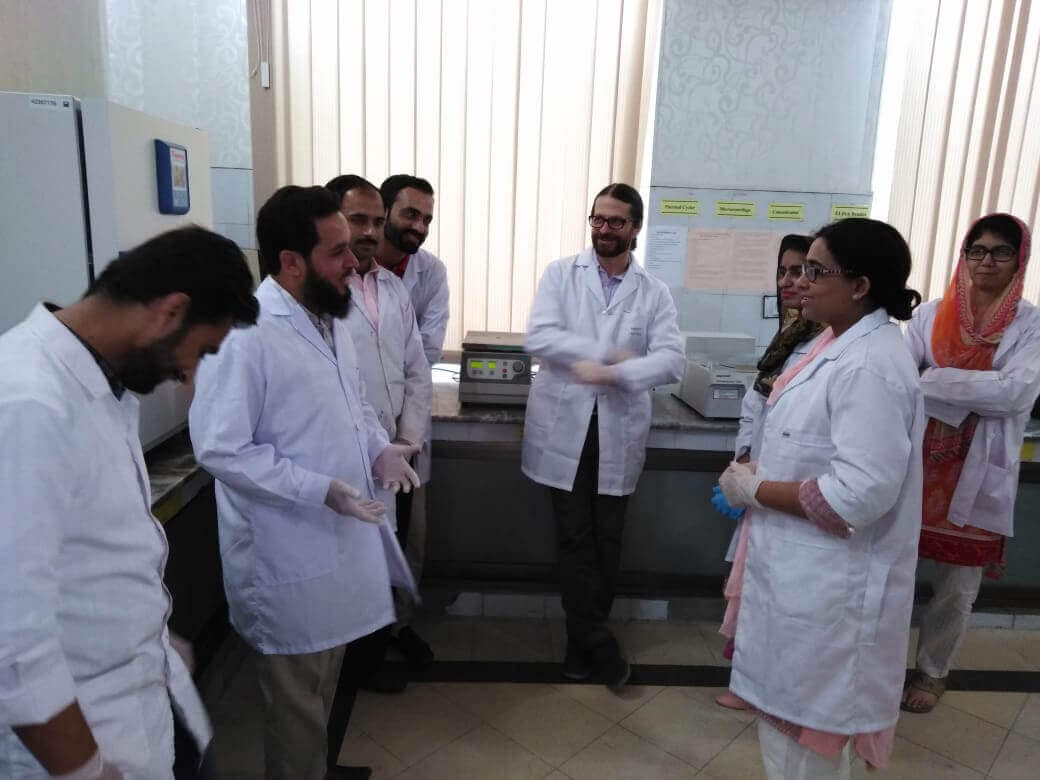To slow down the worldwide development of antibiotic-resistant bacteria, Purdue University professors Paul Ebner, animal sciences, and Nicole Widmar, agricultural economics, have partnered with professors Zafar Hayat and Shafiq ur Rehman from the University of Veterinary and Animal Sciences (UVAS) and University of Punjab, respectively, both in Lahore, Pakistan, to find novel, effective, and affordable alternatives to using traditional antibiotics in Pakistan’s growing poultry industry.
“Antibiotic resistance is totally borderless,” Ebner says.
The more we use antibiotics, Ebner explains, the more bacteria are exposed to—and acquire — antibiotic resistance genes. This has led to a global health crisis as infections become harder to treat in both humans and animals, posing a threat to food security.
While there are numerous drivers for increases in global antibiotic resistance, including overuse of antibiotics in human medicine, both Pakistan and the U.S. have restricted the use of antibiotics in animal agriculture to slow down the development of resistant bacteria.
In response, researchers will develop non-antibiotic compounds that, when combined, are as effective as antibiotics in preventing and treating diseases or improving bird growth, but without the threat of antibiotic resistance. This three-year, multimillion-dollar project is made possible by the financial support of the UK Department of Health and Social Care (DHSC), the Global AMR Innovation Fund (GAMRIF), and the International Development Research Centre (IDRC) in Ottawa, Canada.
“UVAS is one of the oldest educational institutes in Asia. We are working in diverse fields of life sciences and we are pleased to be a lead institution contributing to this important project,” says Talat Naseer Pasha, meritorious professor and vice chancellor of UVAS.
“This is a chance for Purdue to be involved in something that makes a significant impact to Pakistani poultry producers, but the results will be applicable anywhere,” Ebner says.
Their strategy: Make bacteria sick. Bacteria have viruses just like we do, Ebner explains. These viruses, called bacteriophages, target specific bacteria—Salmonella, for example — by injecting their DNA into a bacterial cell, which then makes copies of the virus until the bacterial cell explodes.
While bacteriophages can reduce specific problem-causing bacteria, the research team is also investigating the use of phytochemicals or “nutraceuticals” extracted from different agrowastes common in Pakistan, such as mango peels, to enhance poultry growth and feed efficiency.
“It’s highly unlikely we will ever find a single compound that does all that an antibiotic can do,” Hayat said. “But it’s very likely we can create a cocktail of compounds, each with its own role, that collectively produce the same benefits.”
Researchers will then go one step further. The project has a significant social science component that aims to identify and develop strategies to overcome economic, social, and regulatory barriers to commercializing these compounds.
“The consumer perception regarding newly developed alternatives to antibiotics will be the key driver in their utilization," Hayat said.
To ensure that the project stays focused on practical solutions, an industry advisory board composed of Pakistani poultry producers and animal health professionals will guide the researchers.
“These compounds have to be effective,” Rehman said, “but they also have to be used.”






